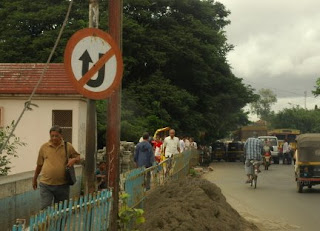So there we were, walking through ankle deep slush, rain pelting down, reaching the temple on the night of 14th August. There is a little village school next to it, typical kind that you see in any small hamlet in Maharashtra (or anywhere in India for that matter.) Just one room with a faded blackboard and few pieces of chalk, that's it. The room would be occupied by 10-15 children of varying ages and thus studying in various grades, while a single teacher would go around teaching 3 or 4 'classes' simultaneously. We camped out in the school for the night and got talking to the teacher. The next morning, as some of us struggled to get breakfast done, the teacher asked us if we could delay our departure by another 45 minutes or so. The flag hoisting ceremony was due in some time, so would we please attend it with the school kids? We of course readily agreed.
And then they came, 10-15 of them, clad in soiled shorts and frocks, trudging barefoot through the fields. As the teacher prepared to get the flag up, Abhijit Kale asked one of the kids, 'so, what happens in school on 15th August?" "We get to eat sweets", pat came the reply. That was it - that's all that the kids knew about 15th August.
All of dutifully saluted the flag and sang Jana Gana Mana. As promised to the children, they got boiled sweets and a piece of bundi laddoo to enjoy. For them, independence day was over. The teacher asked me if I cold speak to the kid for a while and tell them the importance of 15th August. Giving an extempore speech on such an easy topic in front of 15 kids? Simple task - I thought. So there I was. standing right under the tricolour, all ready to talk about the great freedom struggle, the long line of revolutionaries who led several million people against the mighty British empire, the selfless sacrifice, and so on. As I began confidently, I said, "this is the day when the British finally left our country and OUR rule began here."
And then it dawned upon me - 'the British left..... OUR country. ...... OUR rule began. It all made no sense to the kids. They must all be wondering. what's this fellow talking about? WE means who? They means who? Who left? From where? To where?
They had never seen anything beyond their little hamlet, all of about 20 temporary huts on top of this plateau. For them, the world ended at the plateau's edges. So there - I was in a fix. How was I going to explain to them the why and because of 15th August? I was in a place not more than 100 km from Pune (a city well known for its educational facilities, also known as 'Oxford of the East') and here was a school where I was groping for words trying to explain something that I had assumed would be simple for any Indian.
I blabbered for some more time - did try to give them analogy of someone telling their father what to grow, when to grow and how much to grow in HIS field. and that this was exactly what British rule was like. So the British going away was like the farmer having the freedom to decide this for himself, so on. But I don't think they really understood. I was not sure then, I am still not sure today. The day and its memory has continued to haunt me for the last two decades.
Twenty independence days later, India marches on towards prosperity. As the rich become richer and the poor are left wondering why, I am still wondering whether things have changed in Raireshwar.
P.S. - Miraculously, just as I was about to post this, my nephew Viraaj walks in. He went for trek to Raireshwar last year and yes, he has a couple of pics. Yes, not much has changed. Tonight I will try to unearth my own old photo albums and post one of those pics tomorrow. Till then, here's a look at ancient plateau of Raireshwar.






